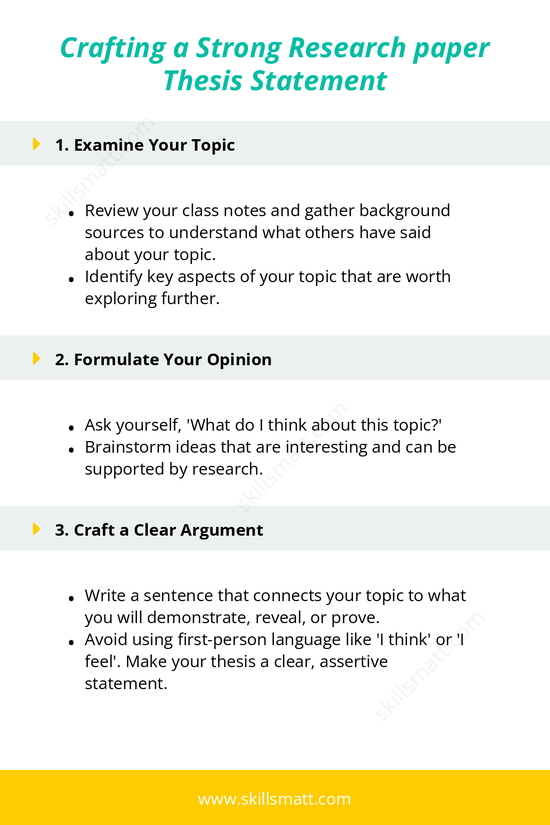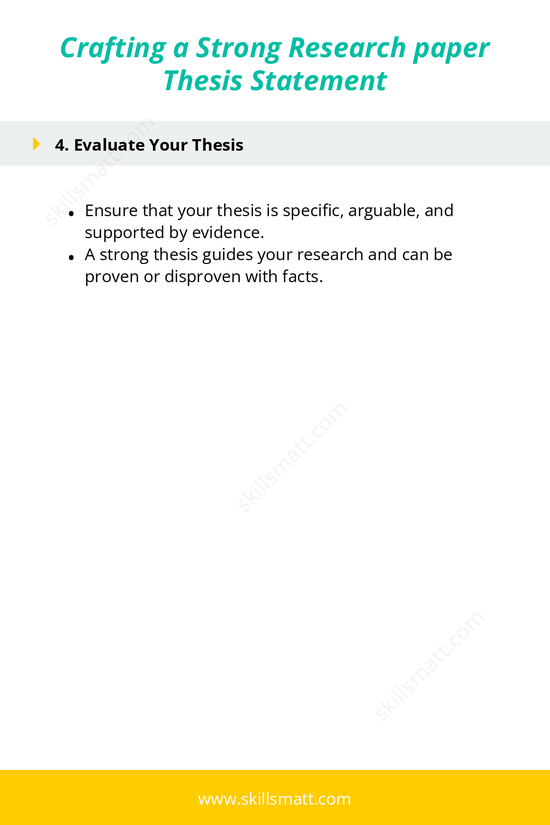Crafting a Strong Research Paper Thesis Statement
One of the most crucial steps in writing a research paper is crafting a strong thesis statement. A well-written thesis sets the tone for the entire paper and guides your research. It presents the central argument you plan to prove, and it should be clear, concise, and supported by evidence throughout the paper. Below are the key steps to crafting a strong research paper thesis statement.
1. Examine Your Topic
- Before you can begin to formulate a strong thesis, you need to understand your topic inside and out. Start by reviewing your class notes, textbooks, and any background materials provided by your instructor. These resources will give you a better understanding of the current discussions surrounding your topic.
- It’s essential to gather various sources to explore different perspectives on your topic. Look for reputable research, articles, or papers that discuss relevant aspects of the issue you are interested in. This research will help you identify the gaps or areas that have not been fully explored yet.
- Once you’ve gathered sufficient information, pinpoint key aspects or questions within your topic that are worth investigating. This could include identifying controversies, contradictions, or underrepresented viewpoints that are worth exploring further in your paper.
2. Formulate Your Opinion
- Now that you have a better understanding of your topic, it’s time to develop your own perspective. A thesis statement should clearly express your stance on the topic, so ask yourself, 'What do I think about this topic?' This helps you move from simply understanding the topic to offering your own insights on it.
- Brainstorm potential ideas and arguments that are interesting, important, and can be backed up with evidence. These ideas should be open to discussion and should lead to a clear conclusion. For example, if your topic is about social media's impact on privacy, you could consider arguments related to data mining, online surveillance, or personal privacy breaches.
- It’s important to ensure that your opinion is based on research and not just personal belief. Your thesis must be something that can be proven or disproven through factual evidence, so be sure to align your perspective with the research you’ve gathered.
3. Craft a Clear Argument
- Once you’ve formulated your opinion, it’s time to turn it into a clear, concise thesis statement. This statement should directly reflect what you will prove or demonstrate in your research paper. A good thesis statement is specific and sets clear expectations for what the paper will discuss.
- To write a strong thesis, avoid vague or general statements like 'Social media is harmful.' Instead, focus on a specific aspect of the issue. For instance, 'Social media platforms, through their data mining practices, pose significant privacy risks to users.' This thesis clearly presents the topic (social media), its focus (data mining), and the stance (privacy risks) in a clear, assertive way.
- Also, avoid using first-person language like 'I think' or 'In my opinion.' Your thesis should present a confident, objective stance. A well-crafted thesis statement should not only provide your argument but also set up the structure of your paper.
4. Evaluate Your Thesis
- After drafting your thesis, take the time to evaluate it. A strong thesis is specific, arguable, and supported by evidence. It should be precise enough to guide your paper but broad enough to provide room for exploration. Make sure your thesis can be defended with logical arguments and empirical evidence.
- Check whether your thesis is debatable. A strong thesis invites discussion and does not simply state an obvious fact. For example, the thesis 'Climate change is real' is not debatable enough for a research paper; however, 'The economic consequences of climate change on small island nations will be devastating unless immediate action is taken' presents a clear, arguable point.
- Lastly, ensure that your thesis is aligned with the research you plan to conduct. The thesis should guide your research and help you focus your analysis. As you gather more information, be prepared to refine or even adjust your thesis statement to reflect the findings of your research.
In conclusion, a well-crafted thesis statement is the foundation of any strong research paper. By carefully examining your topic, formulating your opinion, crafting a clear argument, and evaluating your thesis, you’ll be able to create a statement that provides direction for your research and supports the overall structure of your paper. Remember, a thesis is not just a statement but a guiding principle that shapes your entire paper, so take your time to craft it well.


